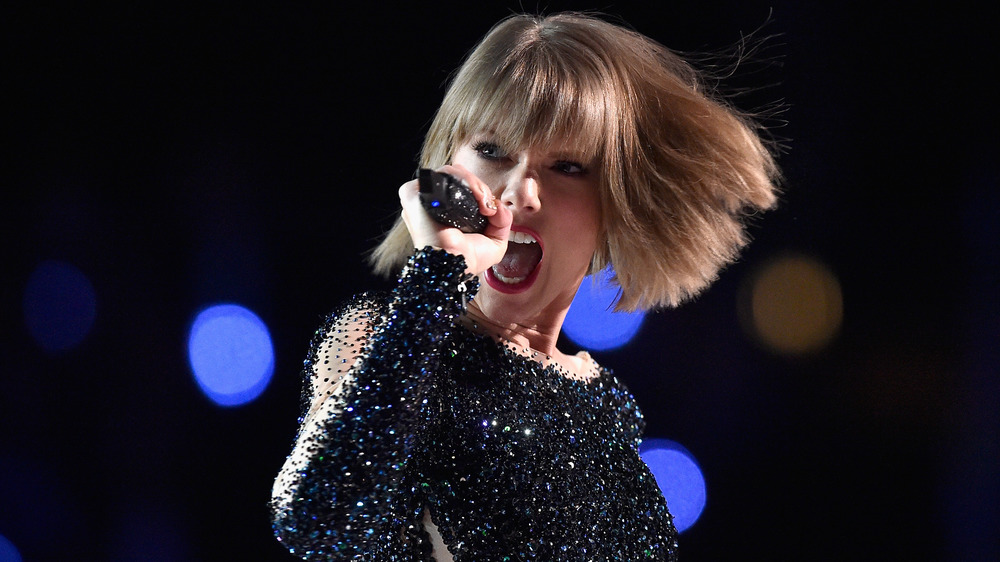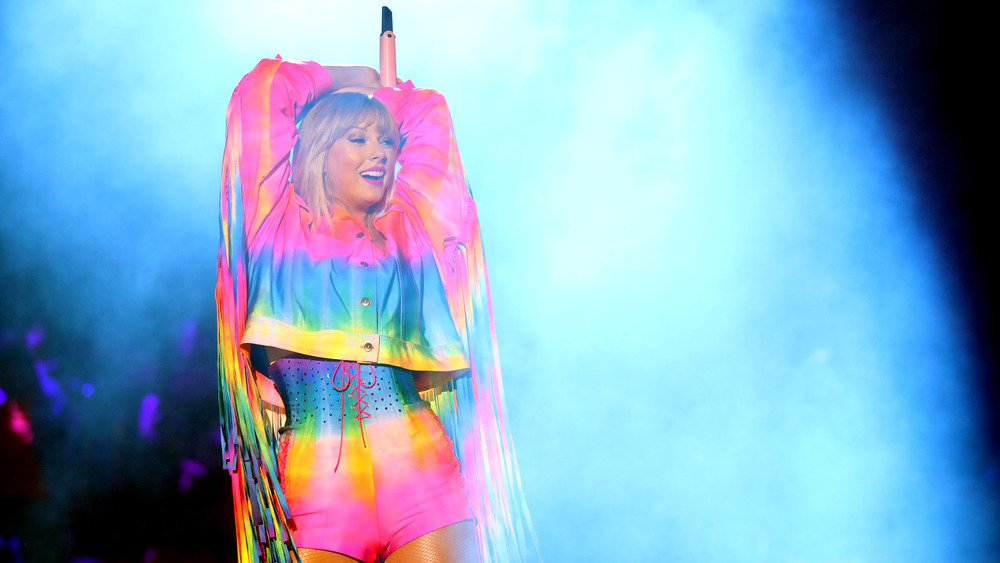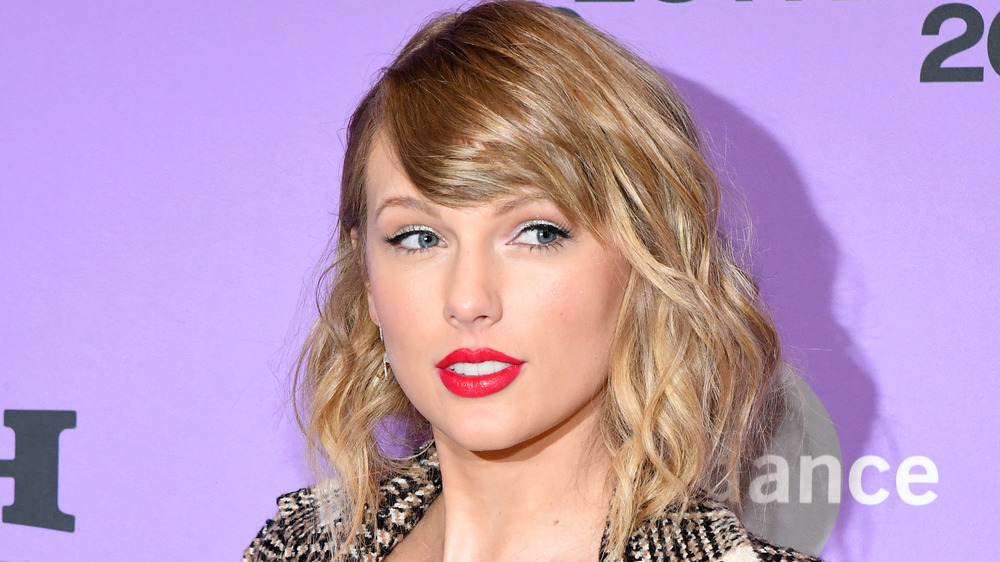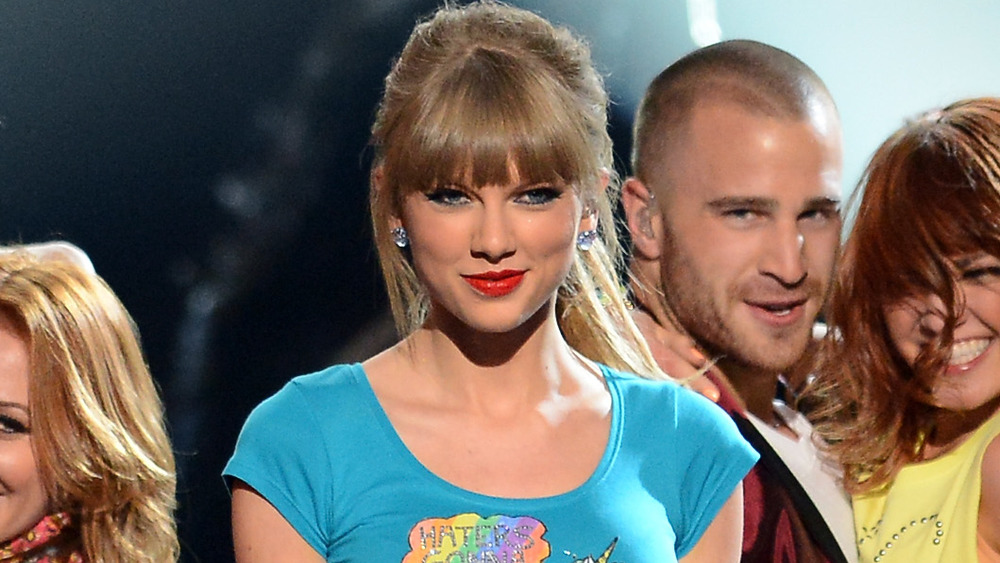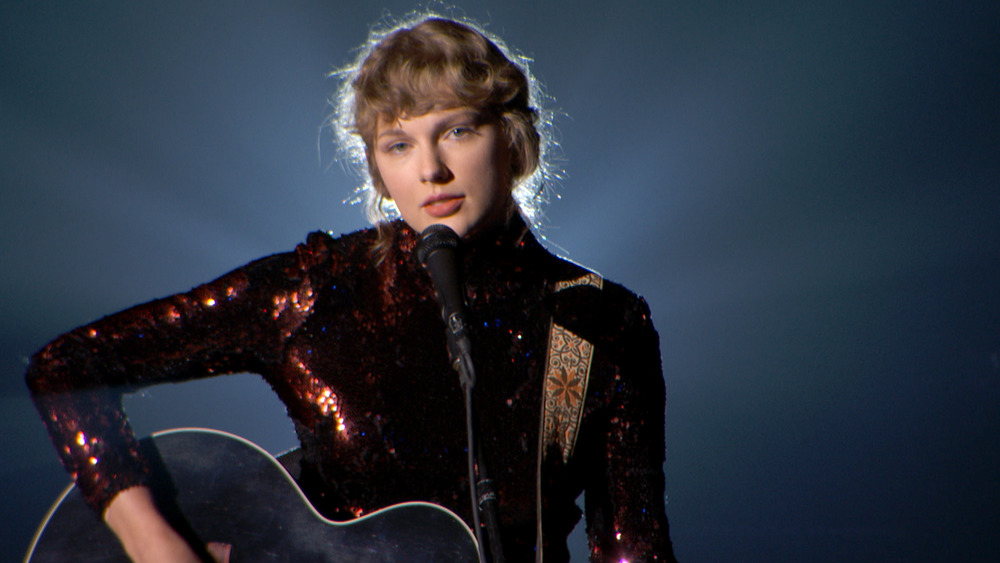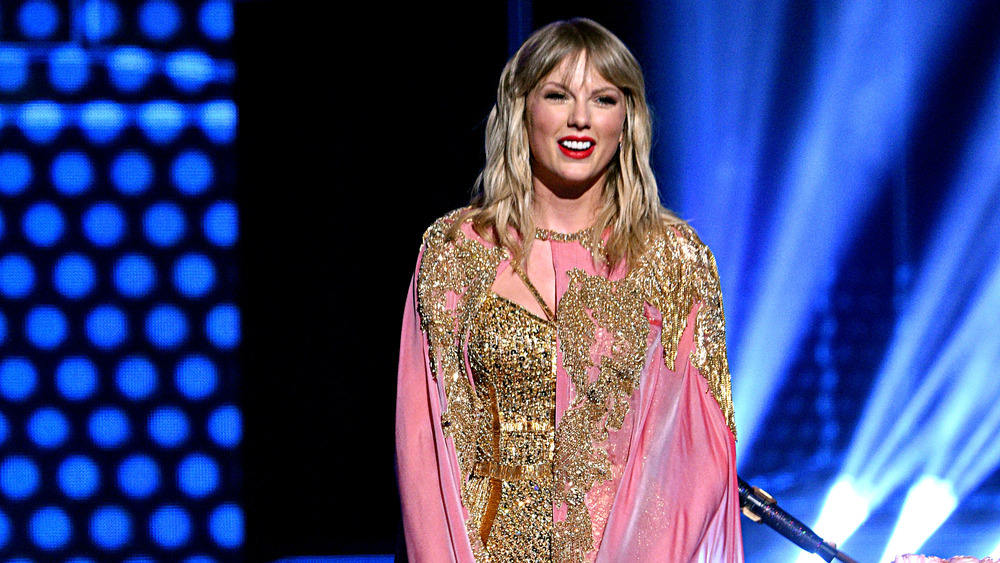Inside Taylor Swift's Game-Changing Moments
Taylor Swift was just 16 years old when she released her first single, "Tim Mcgraw" — a nostalgic ballad about a past love. It's on her self-titled debut album full of sweet country songs by a young girl with potential. She learned to smile for the cameras and write even stronger hooks, and by her 2014 album 1989, she was a bonafide pop star with models for best friends and a very long list of very famous ex-lovers.
Put Swift's face on anything, and you'd sell it — including gossip magazines. The pressure of celebrity seeped into her music on 2017's rebellious reputation, and by 2019 she had a new record label and a new set of rules she made for herself. It's resulted in some of the best music of her career, but more importantly, Swift is finally showing fans who she is explicitly with actions. By opening up, she's helped a lot of people and made a positive impact, so we're taking a look at Taylor Swift's game-changing moments.
When she won a symbolic dollar
In January 2013, while taking a photo at a meet-and-greet event before a show, Taylor Swift said former Colorado DJ David Mueller reached under her skirt and grabbed her butt (via MTV). His employer at the time, KYGO-FM radio, conducted an internal investigation and fired him. Mueller sued Swift in 2015 for $3 million for alleged false allegations and damaging his reputation. In her countersuit, Swift sued Mueller for alleged sexual assault and asked for "a symbolic $1." She won her case and was named Time's "Person Of The Year" in 2017 for her courage in coming forward and her testimony on the stand, during which she reportedly refused to let Mueller's lawyer make her feel guilty for being a victim — Glamour documented 10 stand-out quotes from her testimony.
"I acknowledge the privilege that I benefit from in life, in society and in my ability to shoulder the enormous cost of defending myself in a trial like this," her statement after the trial read in-part (via Variety) "My hope is to help those whose voices should also be heard."
In her first interview after the trial for Time, she said of her demeanor in court, "This man hadn't considered any formalities when he assaulted me, and his lawyer didn't hold back on my mom — why should I be polite?" She had a message for other sexual assault victims. "My advice is that you not blame yourself and do not accept the blame others will try to place on you."
Her explicit support of the LBGTQIA community
Taylor Swift released "You Need To Calm Down" — an anthem that calls out internet trolls and explicitly supports the LBGTQIA community — on June 14, 2019. It has lyrics like "Why are you mad when you could be GLAAD?" and "Shade never made anybody less gay." The song is supportive, but we'd be remiss not to mention the criticism the song and video have received for queerbaiting and using famous friends to help Swift excuse the fact that she hasn't publicly supported the LBGTQIA community sooner. "Taylor waited a relatively long time: until after Katy Perry, after Lady Gaga, after Kacey Musgraves," declared The New York Times. They called the video, full of queer celebrities, "a worthy celebration, but it is also plausible cover."
Swift told Vogue it's hard to know when to speak out. "I didn't realize until recently that I could advocate for a community that I'm not a part of. It's hard to know how to do that without being so fearful of making a mistake that you just freeze," she said about why she chose to speak out in 2019. "Because my mistakes are very loud. When I make a mistake, it echoes through the canyons of the world." The writer called her answers "direct, not performative or scripted." She also has a history of supporting the community with money, like when she donated $113,000 to the Tennessee Equality Project to help fight anti-LBGTQIA legislation, per Billboard.
Miss Americana gets vulnerable
Miss Americana, a Netflix documentary about Taylor Swift, was released in January 2020. In the film, Swift is more candid about her personal struggles than she has been in the past. She admits that body image struggles caused her to have an eating disorder. She says in the documentary she can't look at pictures of herself too often because if she thinks she looks fat in them or sees too many comments about her body, "that'll just trigger me to starve a little bit, just stop eating." She continues, "I thought that I was just like, supposed to feel like I was gonna pass out at the end of a show or in the middle of it." She doesn't mention seeking treatment for the behavior and says she doesn't do it anymore but admitted, "There's always some standard of beauty that you're not meeting."
In Miss Americana, Swift also admits that the public's negative perception of her has done some serious damage to her self-esteem. "[Celebrities are] people who got into this line of work because we wanted people to like us," she says. "'Cause we were intrinsically insecure because we liked the sound of people clapping 'cause it made us forget about how much we feel like we're not good enough." So when people weren't clapping anymore, it hurt. Of the negativity she faces, she says through tears, "It just gets loud sometimes."
Taylor Swift is political now
While promoting her Red album on the Late Show with David Letterman in 2012, Taylor Swift famously deferred a question when the host tried to get her to elaborate on who she'd be voting for. "I feel like at 22, it's my right to vote but it's not my right to tell other people what to do," she said, receiving a fist bump of approval from Letterman.
In 2018, she rejected that statement from her younger self when she made an Instagram post slamming Tennessee Senator Marsha Blackburn's discriminatory record and stated she'd be supporting Democratic candidate Phil Bredesen for Senate and Jim Cooper for House of Representatives. "In the past I've been reluctant to publicly voice my political opinions, but due to several events in my life and in the world in the past two years, I feel very differently about that now,' she wrote explaining her change of heart. "I always have and always will cast my vote based on which candidate will protect and fight for the human rights I believe we all deserve in this country." In the post, Swift goes on to denounce systemic racism and homophobia.
"Rights are being stripped from basically everyone who isn't a straight white cisgender male," Swift told Vogue in 2019 about why she decided to get political now. She debuted "Only The Young," a song meant to inspire young people to make their own change, in the 2020 Netflix documentary Miss Americana.
She's taking steps to control her own music
Taylor Swift doesn't own the master recordings of the music on her first six albums, but she's taking very public steps to try and rectify the situation as best she can. It's resulted in a feud between Swift, the president of her former record label Big Machine Records, Scott Borchetta, and artist manager Scooter Braun.
In June 2019, Borchetta sold Big Machine Records — including Swift's master recordings — to Braun, which Swift was unhappy about. "Some fun facts about today's news: I learned about Scooter Braun's purchase of my masters as it was announced to the world," she wrote in a Tumblr post. "All I could think about was the incessant, manipulative bullying I've received at his hands for years." She goes on to allege that Braun was behind several instances that rapper Kanye West bullied her and said Borchetta knew how she felt. "[Borchetta] knew what he was doing; they both did. Controlling a woman who didn't want to be associated with them. In perpetuity. That means forever."
In August of 2019, Swift confirmed on Good Morning America that she was re-recording her masters as soon as she was contractually allowed to in November 2020. When Braun sold the masters again in November 2020, Swift released a statement confirming that he would still profit off of her music for many years and announcing that she'd begun the process of recording her old music.
Taylor Swift is saving music during a difficult time
The COVID-19 pandemic has undoubtedly affected everyone, but Taylor Swift has done what she can to try and save the music. Rolling Stone spoke with a co-owner of Nashville's independently owned record store Grimey's, who confirmed Swift had "generously offered some direct relief to my staff and to cover three months of our health care costs for our group-insurance plan." He continued, "This assistance from Ms. Swift helps give us a real shot at coming back on the other side of this."
Swift has essentially made it her mission to help her fans as well through the difficult time as she's released not one but two albums during the pandemic of 2020 — folklore and evermore. One of the songs off of the first album, July 2020's folklore, even has a verse dedicated to healthcare workers on the front lines. "Something med school/Did not cover/Someone's daughter/Someone's mother/Holds your hand through plastic now/Doc, I think she's crashin' out/And some things you just can't speak about," Swift sings during a verse in "epiphany."
"There are people right now talking a 20-minute break in-between shifts at a hospital who are having this kind of trauma happen to them right now that they will probably never want to speak about," Swift said in the Folklore: The Long Pond Studio Sessions documentary on Disney Plus about what inspired the verse.
She's written epic feminist anthems
Taylor Swift's aforementioned sexual assault trial is just one example of the hurdles females in the industry have to climb over more often than their male peers. Swift has gotten braver about expressing her thoughts on her struggles as a female musician since she left Big Machine Records. First, she wrote "The Man" on 2019's Lover in which she envisions her life as a man a la Beyonce's "If I Were A Boy."
"They'd say I hustled, put in the work/They wouldn't shake their heads and question how much of this I deserve/What I was wearing, if I was rude/Could all be separated from my good ideas and power moves," the second verse muses before a chorus that simply states, "'Cause if I was a man, then I'd be the man/I'd be the man."
On 2020's folklore, Swift gets a little bit more serious as she explores female anger on "Mad Woman." "The most rage-provoking element of being a female is the gaslighting that happens when for centuries we've been just expected to absorb male behavior silently," she said, of what inspired the lyrics. "And oftentimes when we ... respond to bad male behavior or somebody just doing something that was absolutely out of line ... that response is treated like the offense itself," she explained in the Disney Plus documentary Folklore: The Long Pond Studio Sessions. Swift sings lyrics like, "And when you say I seem angry, I get more angry/And there's nothing like a mad woman."
Taylor Swift fixes her mistakes
Even though she's now bold enough to speak out for social justice issues, Taylor Swift and her team still make mistakes. When Amira Rasool, founder and CEO of the African clothing brand The Folklore realized that Swift's team used the words "the folklore" on official album merchandise in a similar style to her logo, she was surprised. "Clearly Taylor didn't find The Folklore and make this sketch," Rasool told InStyle. "But at the end of the day, Taylor is the one who's profiting off of it. This is her team. So it's up to her to make it right."
Swift did make it right, in a rather swift and smooth manner, we might add. InStyle reported that she had the logo altered rather quickly and put her lawyers in touch. She also personally tweeted Rasool with a pledge, "Amira, I admire the work you're doing and I'm happy to make a contribution to your company and to support the Black in Fashion Council (launching on 8/3) with a donation," Swift wrote. Lady A the band should take notes.

